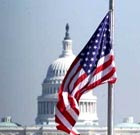|
|
|
Attorney general pick has had terrorism cases
Breaking Legal News |
2007/10/15 06:53
|
Early in the Bush administration, Michael Mukasey's position at the intersection of terrorism and the justice system may have cost him a promotion. Mukasey, then chief judge of the federal court in Manhattan, caught the eye of the White House in early 2002 for elevation to the U.S. Court of Appeals. A conservative intellectual whose admirers cut across party lines, he was running the nation's busiest courthouse just a mile from Ground Zero, one that had handled trials of Islamic radicals for nearly a decade.
But that June, President George W. Bush declared "dirty bomb" suspect Jose Padilla an enemy combatant. When Padilla's lawyers filed a challenge, Mukasey drew the case. White House lawyers decided they could not offer him the appellate post without seeming to undermine his impartiality, those familiar with the issue said.
Now, Mukasey's experiences in the Padilla case and other terrorism prosecutions undergird his credentials for nomination to become attorney general.
Mukasey recently argued in an opinion article for The Wall Street Journal that Congress should find ways to relieve the strain on a legal system trying to stop terrorist plots while still guarding the rights of terrorist suspects. He has advocated national security courts, where classified information could be presented in secret.
"If there is anybody who has a handle on the debate on terrorism issues, it's him," said David Kelley, who served as New York's U.S. attorney from 2003 to 2005. "He is one of the only people who has sufficient practical experience together with the intellectual ability."
The 1995 trial of Omar Abdel Rahman, an Egyptian known as the blind sheik, in the 1993 bombing of the World Trade Center presented Mukasey with questions that have fueled public debate since 9/11: how to ensure lawful treatment for terror suspects without impeding government efforts to protect citizens from attack.
Three years of litigation, including a nine-month trial, served as a "deep primer" on radical Islam, said Mary Jo White, the former U.S. attorney who brought the case. Andrew McCarthy, who led the prosecution, recalled months of litigation over questions on the limits of free speech and religious practice and the difficulty of prosecuting terrorism without making classified information public. "The arguments we've been having the last six years are the arguments we were having then," McCarthy said.
The appeals court had high praise for Mukasey's handling of the case, saying he "presided with extraordinary skill." Prosecutors in other terrorism cases say they study his jury instructions on the use of speech and religious convictions as evidence.
Only one of several attorneys interviewed who had clients in Mukasey's court after 9/11 had complaints about the way his client was treated.
However, Alexander Eisemann, who represented Zacarias Moussaoui's driver, said Mukasey was responsive to complaints that Hussein al-Attas was being physically mistreated in detention.
Also, Mukasey was presented with what has proved to be an intractable issue in dealing with suspected terrorists - Bush's assertion that he has the authority to designate even people captured in the U.S. as "enemy combatants." In late 2002, the judge gave the White House a split decision in the case, upholding the president's authority to consider an American citizen detained on U.S. soil an enemy combatant but ruling that Padilla was entitled to a lawyer who could challenge that status. |
|
|
|
|
|
|
Class action or a representative action is a form of lawsuit in which a large group of people collectively bring a claim to court and/or in which a class of defendants is being sued. This form of collective lawsuit originated in the United States and is still predominantly a U.S. phenomenon, at least the U.S. variant of it. In the United States federal courts, class actions are governed by Federal Rules of Civil Procedure Rule. Since 1938, many states have adopted rules similar to the FRCP. However, some states like California have civil procedure systems which deviate significantly from the federal rules; the California Codes provide for four separate types of class actions. As a result, there are two separate treatises devoted solely to the complex topic of California class actions. Some states, such as Virginia, do not provide for any class actions, while others, such as New York, limit the types of claims that may be brought as class actions. They can construct your law firm a brand new website and help you redesign your existing law firm site to secure your place in the internet. |
Law Firm Directory
|
|





